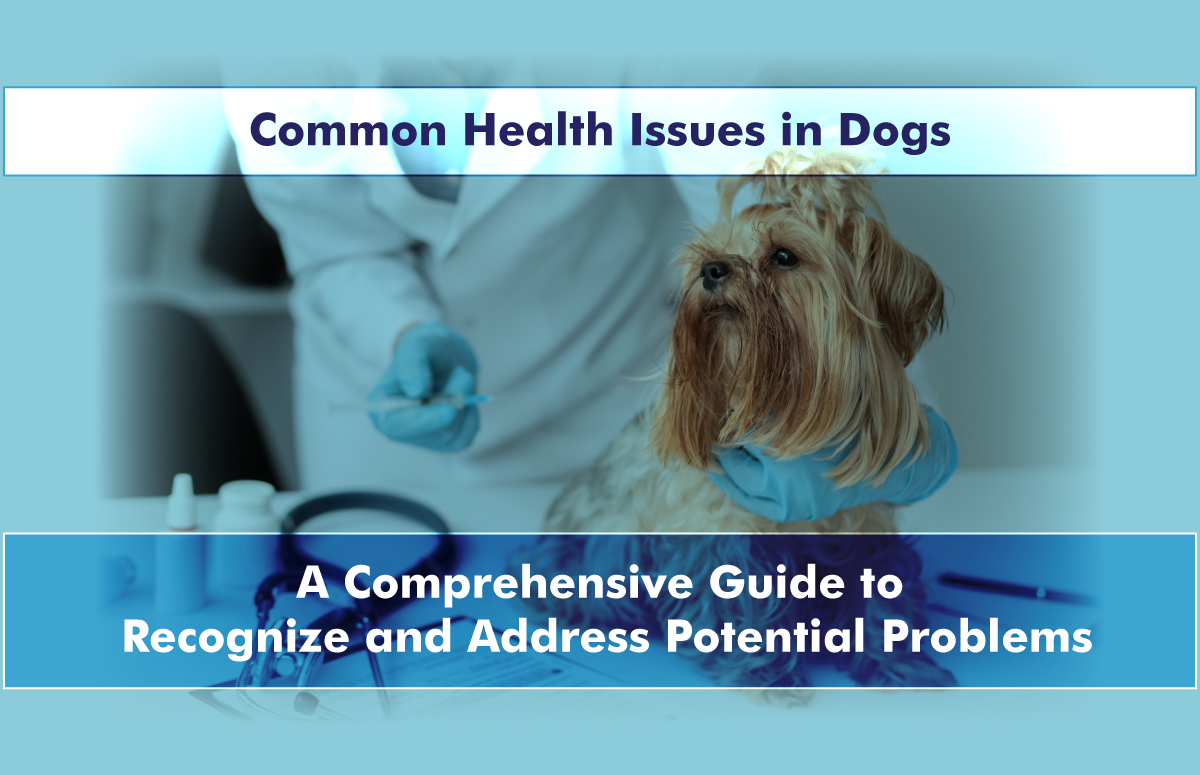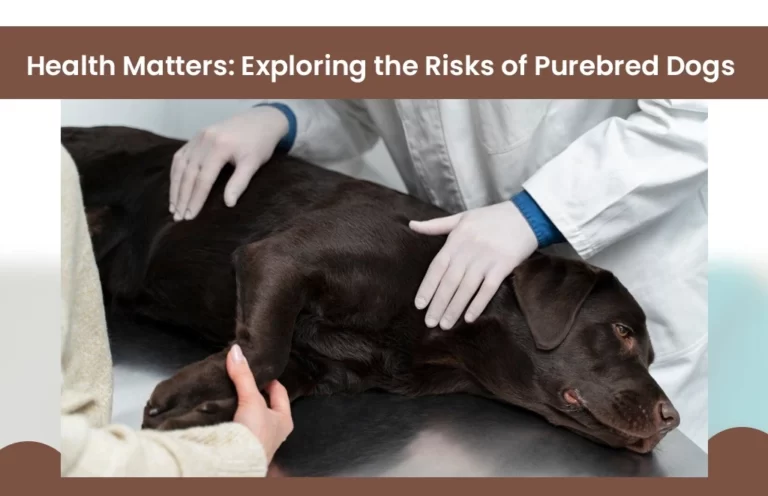Common Health Issues in Dogs: A Comprehensive Guide to Recognize and Address Potential Problems
Table of Contents
- Introduction
- 1. Understanding the Importance of Canine Health
- 3. Prevention and Treatment of Common Health Issues
- 4. When to Seek Veterinary Care
- FAQs
- Conclusion
Introduction
As a dog owner, you must be aware of common health issues that can affect your furry friend. From allergies to dental problems, understanding these issues can help you recognize early signs and seek appropriate care. This comprehensive guide aims to provide valuable insights into various health problems that dogs commonly face and tips on prevention and treatment. Let’s delve into the world of canine health and equip ourselves with the knowledge needed to keep our beloved pets happy and healthy.
1. Understanding the Importance of Canine Health
This section discusses the significance of prioritizing your dog’s health and the benefits of early detection and prevention.
Maintaining your canine companion’s health is essential for their overall well-being and longevity. Just like humans, dogs can experience various health issues throughout their lives. By understanding the importance of canine health and taking proactive measures, you can provide the best care for your furry friend.
A healthy dog is a happy dog, and there are several advantages to prioritizing your dog’s health:
a. Increased Lifespan: Dogs that receive proper healthcare and preventive measures tend to live longer lives. Regular veterinary check-ups, vaccinations, and a balanced diet contribute to their overall health and longevity.
b. Improved Quality of Life: When your dog is healthy, it can enjoy an active and fulfilling life. They are more energetic and playful and can engage in various activities with you and your family.
c. Early Detection of Health Issues: Regular monitoring and veterinary check-ups allow for the early detection of potential health problems. Timely intervention can prevent conditions from worsening and provide better treatment outcomes.
2. Recognizing Common Health Issues in Dogs
This section covers a range of common health issues in dogs, including allergies and skin conditions, dental problems, obesity, arthritis, digestive disorders, ear infections, eye problems, heartworm disease, respiratory issues, and cancer. Each subsection provides detailed information about the signs, causes, and potential treatment options for these issues.
Understanding the prevalence of common health issues in dogs can help you recognize potential problems and take appropriate measures. Here are some statistics related to canine health:
a. Allergies: Allergies are a common health issue in dogs, affecting around 10% of the canine population. Common allergens include pollen, dust mites, certain foods, and flea bites.
b. Dental Problems: Dental disease is prevalent in dogs, with approximately 80% of dogs showing signs of dental issues by age three. Poor dental hygiene can lead to gum disease, tooth decay, and other oral health problems.
c. Obesity: Obesity affects around 50% of dogs, leading to various health issues such as joint problems, diabetes, heart disease, and decreased overall quality of life.
d. Arthritis: Arthritis, a degenerative joint disease, is common in older dogs, affecting approximately 20% of the canine population. It causes pain, stiffness, and reduced mobility.
e. Digestive Disorders: Digestive issues, including diarrhoea, vomiting, and gastrointestinal diseases, are among the top health concerns in dogs, accounting for many veterinary visits.
f. Ear Infections: Ear infections are prevalent in dogs, especially those with long, floppy ears. As per data, around 20% of dogs will eventually experience an ear infection.
g. Eye Problems: Various eye conditions, such as cataracts, glaucoma, and dry eye, can affect dogs, leading to vision impairment or blindness.
h. Heartworm Disease: Heartworm disease is a severe and potentially fatal condition transmitted by mosquitoes. It affects dogs in many parts of the world, and preventive measures are crucial.
i. Respiratory Issues: Dogs can suffer from respiratory problems, including allergies, asthma, bronchitis, and pneumonia.
j. Cancer: Cancer is unfortunately prevalent in dogs, with certain breeds being more prone to specific types of cancer. Early detection and treatment are critical for a better prognosis.
By being aware of these statistics and understanding the common health issues in dogs, you can proactively safeguard your pet’s health and take appropriate preventive measures.
Note: It’s essential to consult with your veterinarian for personalized advice and have the vet address any specific health concerns regarding your dog.
3. Prevention and Treatment of Common Health Issues
Here, we delve into proactive measures and practices to prevent and manage common health problems. We discuss the importance of proper nutrition, regular veterinary check-ups, vaccinations, exercise, dental care, parasite control, and more.
3.1 Flea and Tick Prevention
Fleas and ticks are bothersome and can transmit diseases to your dog. Prevention is essential to protect your furry friend from these parasites. Here are some preventive measures and treatment options:
a. Regular Use of Flea and Tick Preventives: Administering monthly flea and tick preventives can help keep these parasites at bay. Various options include spot-on treatments, oral medications, and collars. Consult with your veterinarian to determine the most suitable product for your dog.
b. Environmental Control: Regularly clean and vacuum your home to reduce the presence of fleas and ticks. Wash your dog’s bedding in hot water to eliminate any parasites.
c. Tick Checks: Carefully inspect your dog for ticks after outdoor activities. Please pay close attention to their ears, underarms, groin area, and between their toes. Promptly remove any ticks using tweezers or a tick removal tool.
3.2 Dental Care
Maintaining proper dental hygiene is crucial for your dog’s overall health. Poor dental health can lead to dental diseases, infections, and other health issues. Here’s how to ensure good dental care for your dog:
a. Regular Brushing: Brush your dog’s teeth regularly with a dog-specific toothbrush and toothpaste. Start slowly and gradually introduce the process to make it a happy experience for your dog.
b. Dental Treats and Toys: Provide dental treats and toys that promote dental health. These can help reduce plaque and tartar buildup.
c. Professional Dental Cleaning: Schedule regular dental cleanings with your veterinarian. Professional cleanings involve removing plaque and tartar from your dog’s teeth, ensuring optimal oral health.
3.3 Weight Management
Obesity is a significant health concern for dogs, leading to various health issues. Maintaining a healthy weight is essential for your dog’s overall well-being. Here are some tips for weight management:
a. Balanced Diet: Feed your dog a balanced and appropriate diet according to breed, age, and activity level. Avoid overfeeding and excessive treats.
b. Portion Control: Measure your dog’s food portions to prevent overeating. Consult with your veterinarian to determine the right food for your dog.
c. Regular Exercise: Engage your dog regularly to keep them active and maintain an ideal weight. Daily walks, playtime, and interactive toys can help burn calories and keep your dog fit.
3.4 Ear Care
Ear infections are prevalent in dogs with long, floppy ears. Proper ear care can help prevent infections and discomfort. Consider the following tips for maintaining ear health:
a. Regular Inspection: Check your dog’s ears for signs of redness, swelling, discharge, or odour. If you notice any abnormalities, consult with your veterinarian.
b. Gentle Cleaning: Clean your dog’s ears with a veterinarian-recommended ear cleaner. Use a cotton ball or soft cloth to gently wipe the outer ear area. Avoid inserting anything deep into the ear canal, as it can cause injury.
c. Drying After Baths: After bathing your dog, thoroughly dry their ears to prevent moisture buildup, which can contribute to developing infections.
Remember, while these preventive measures are necessary, it’s essential to consult with your veterinarian for personalized advice and guidance based on your dog’s specific needs. Regular veterinary check-ups and open communication with your vet will help ensure your dog’s health and well-being. 4. When to Seek Veterinary Care
4. When to Seek Veterinary Care
Knowing when to seek veterinary care is crucial for the well-being of your dog. While preventive measures are essential, there are times when professional veterinary assistance is necessary. Here are some situations when you should consider seeking veterinary care:
a. Persistent Symptoms: If your dog is experiencing persistent or worsening symptoms, it’s essential to consult with a veterinarian. These symptoms may include prolonged diarrhoea, vomiting, lethargy, loss of appetite, excessive thirst, or difficulty breathing. Persistent symptoms can indicate an underlying health issue requiring medical attention.
b. Injury or Trauma: If your dog has been involved in an accident, suffered a significant injury, or experienced trauma, it’s essential to seek veterinary care immediately. Even seemingly minor injuries can have underlying severe complications.
c. Behavioral Changes: If you notice sudden changes in your dog’s behaviour, such as aggression, anxiety, excessive fear, or unusual vocalizations, it’s recommended to consult with a veterinarian. Behavioural changes sometimes indicate an underlying medical condition or require behaviour modification strategies.
d. Difficulty Urinating or Defecating: If your dog is having difficulty urinating or defecating or producing abnormal urine or stool, it’s essential to seek veterinary care. These symptoms may indicate urinary tract infections, blockages, or gastrointestinal issues that require prompt attention.
e. Persistent Itching or Skin Problems: If your dog is constantly itching, scratching, or experiencing skin problems, it’s advisable to consult with a veterinarian. Persistent itching can indicate allergies, skin infections, or other dermatological issues that need professional diagnosis and treatment.
f. Changes in Appetite or Weight: Significant changes in your dog’s appetite, such as sudden loss of appetite or excessive eating, as well as unexplained weight loss or weight gain, should be addressed by a veterinarian. These changes can indicate underlying health conditions that require evaluation and treatment.
g. Reproductive Health Concerns: If your dog is exhibiting signs of reproductive health issues, such as abnormal discharge, prolonged heat cycles, or difficulty during labour, it’s essential to seek veterinary care. These issues can pose risks to your dog’s health and may require medical intervention.
h. Aging and Senior Care: Regular veterinary check-ups become even more critical as your dog ages. Senior dogs may require specialized care and monitoring for age-related conditions such as arthritis, cognitive decline, or organ dysfunction. Regular check-ups can help detect and manage these issues effectively.
Remember, this is not an exhaustive list; every dog is unique. If you are concerned about your dog’s health or well-being, it’s always better to consult a veterinarian. They can provide professional guidance, perform necessary diagnostic tests, and recommend appropriate treatments to ensure your dog receives the best care possible.
FAQs
What are the common health issues that dogs face?
Dogs can experience various common health issues, including allergies, infections, gastrointestinal problems, dental diseases, arthritis, obesity, skin conditions, and respiratory infections.
How can I prevent common health issues in my dog?
Prevention involves regular veterinary check-ups, vaccinations, a balanced diet, exercise, parasite control, dental care, and a clean and hygienic living environment for your dog.
Are there specific breeds more prone to certain health issues?
Certain dog breeds may be more predisposed to specific health conditions. For example, large breeds may be prone to hip dysplasia, while brachycephalic breeds can experience respiratory issues.
What should I do if my dog shows signs of illness?
If your dog displays signs of illness, such as lethargy, loss of appetite, vomiting, diarrhoea, or unusual behaviour, it’s best to consult a veterinarian for a proper diagnosis and treatment.
Can I treat my dog’s health issues at home?
Minor issues like minor cuts or superficial skin irritations can often be managed at home with proper care. However, it’s always recommended to consult a veterinarian for proper diagnosis and treatment, especially for more severe health issues.
How do I know when it’s an emergency?
In emergency situations such as severe injuries, difficulty breathing, choking, or signs of poisoning, it’s crucial to seek immediate veterinary care. Trust your instincts, and don’t hesitate to contact your veterinarian or an emergency clinic.
Are there natural remedies or supplements that can help with specific health issues in dogs?
Some natural remedies and supplements may support certain dog health issues. However, it’s essential to consult a veterinarian before introducing new treatments to ensure their safety and effectiveness.
How often should I take my dog for a veterinary check-up?
Regular veterinary check-ups are recommended at least once a year for adult dogs. Senior dogs or dogs with existing health conditions may require more frequent visits.
Are there any warning signs of potential health issues in dogs?
Warning signs include changes in appetite, weight loss, excessive thirst, frequent urination, lethargy, changes in behaviour, vomiting, diarrhoea, coughing, difficulty breathing, and abnormal discharge.
Can I prevent genetic health issues in my dog?
While genetic health issues cannot be entirely prevented, responsible breeding practices, genetic testing, and purchasing from reputable breeders can help reduce the likelihood of certain inherited conditions.
Remember, if you have any specific concerns about your dog’s health, it’s best to consult with a veterinarian for personalized advice and guidance.
Read More: 7 Tips for First-Time Pet Owners: A Comprehensive Guide to a Happy and Healthy Pet
Conclusion
A happy and healthy dog is a cherished companion for a lifetime. Caring for your dog’s health involves being proactive, observant, and knowledgeable. Understanding common health issues, implementing preventive measures, and seeking timely veterinary care can significantly contribute to your dog’s overall well-being and longevity.
In conclusion, this comprehensive guide has provided valuable insights into common health issues in dogs. By incorporating preventive measures, recognizing early signs, and seeking appropriate care, you can ensure your furry friend enjoys a long, healthy, and fulfilling life by your side.
Note: Consult a veterinarian for accurate diagnosis and personalized advice for your dog’s health needs.







